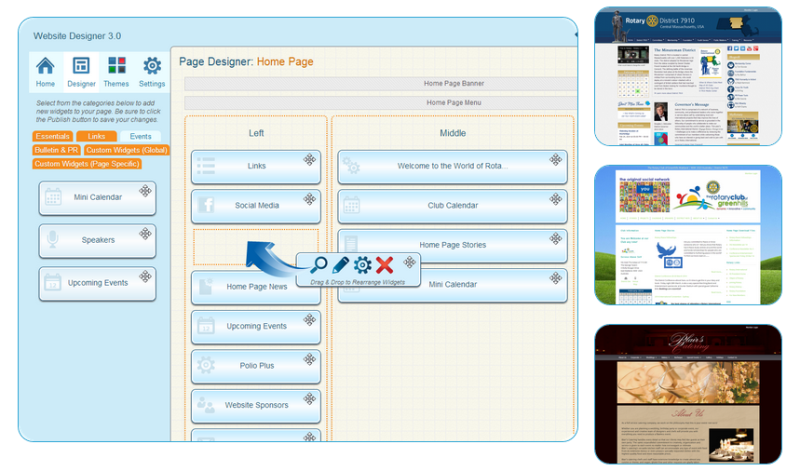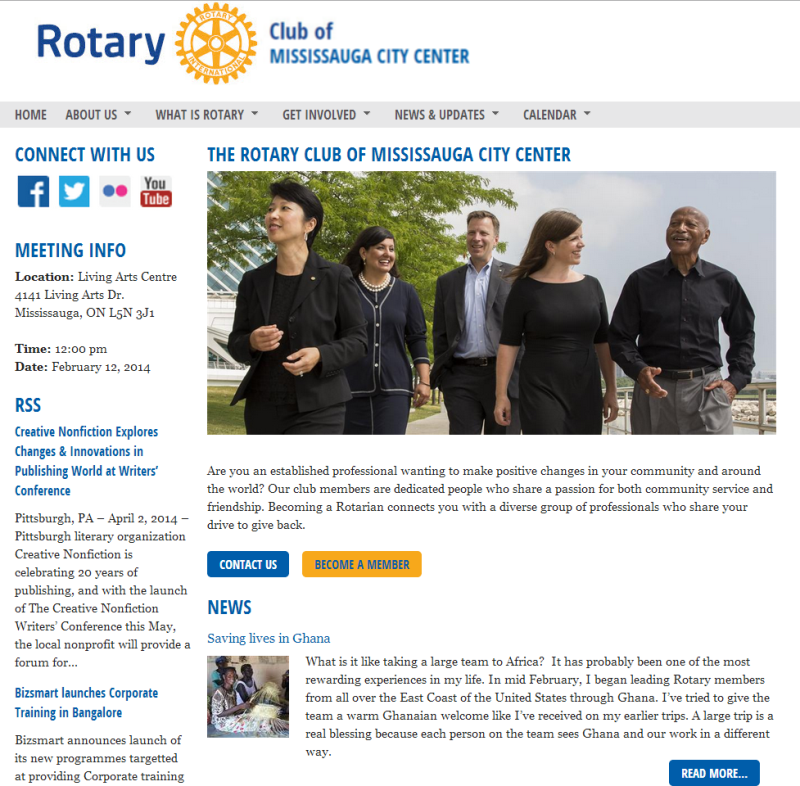Website vs Social Media
Website vs. Social Media
Why is a website more important than a social presence?
Your club needs an online presence to be found. The question is, is a Facebook page or Twitter account enough? When you think about it, it sounds like a good idea - your audience is already using these platforms, it's easy to post your messages and it's free. So, do you really even need that website?
Time and time again, we've seen clubs opt to maintain only a social media profile, to eventually learn that it was a mistake. We're conditioned to expect that the information we're seeking can easily be found online, but why exactly is a website important?
Websites are customizable
 Social media platforms such as Facebook require you to use their layout. Apart from being able to add a header image, there aren't many customization options available, and for any that are, they require you to have a strong technical background.
Social media platforms such as Facebook require you to use their layout. Apart from being able to add a header image, there aren't many customization options available, and for any that are, they require you to have a strong technical background.
Websites on the other hand are like a blank canvas that you can make your own. You add your own unique touch. Paper calling cards have been replaced with websites, that have the added benefit of displaying more information than you could ever include in your elevator pitch, and how you display that information and break it up is up to you. Whether you want to share information through a video, slideshow, text or all three, websites allow you to do it while keeping in line with your brand.
Content visibility can be controlled
 Sure it's easy to post your messages on Facebook, but are they making it to your readers? Facebook for example has a complicated algorithm that controls how and when your posts are displayed and to whom. The reality is that these posts are competing with many other posts on your end users' news feed, and how they engage with your page and posts play a big role in whether they actually even see your posts or not. For example, a member that ‘likes’ or comments on almost every post is a relatively engaged member and thus would see your posts more often than someone who follows your page in the hopes of being up to date with the latest news. To ensure your posts are seen by more people, you would have to pay to sponsor your posts and gain more impressions.
Sure it's easy to post your messages on Facebook, but are they making it to your readers? Facebook for example has a complicated algorithm that controls how and when your posts are displayed and to whom. The reality is that these posts are competing with many other posts on your end users' news feed, and how they engage with your page and posts play a big role in whether they actually even see your posts or not. For example, a member that ‘likes’ or comments on almost every post is a relatively engaged member and thus would see your posts more often than someone who follows your page in the hopes of being up to date with the latest news. To ensure your posts are seen by more people, you would have to pay to sponsor your posts and gain more impressions.
More so, as you continue to add new posts, your older entries get buried towards the bottom making it very difficult for anyone interested in content you’d posted last week finding. If someone cannot easily find the information they're looking for, they will simply disengage themselves.
However, when sharing information through a website, you can control where and how that information is presented. Your message is not hidden behind the ads, chat windows, etc. Further you can clearly convey a message and control how the user will navigate through your website (links they'll click on, how they'll access secondary pages, etc.).
Your audience expects a website
Simply said, websites are today's standard format for having an official presence. We expect to find a website representing an organization where we can read what the club is all about. In fact, we've become accustomed to think of websites as symbols of authenticity. When we find businesses or even organizations without websites, we question whether they in fact are legitimate, active and genuine. It's all about perception.
 You can measure website impressions
You can measure website impressions
Through your website, you can capture a wealth of information about how prospective members or current members engage with your site. Where you attract the majority of your visitors from, to the most popular links, you gain insight into what is working and what can be improved to have you meet your goals.
One vs. the other
All that being said though, the answer is not just one or the other. In fact, the question should not ask you to choose either. As a service club focused on increasing visibility and engaging the community to further promote your causes, your focus really is on how to maximize your 'brand' as such, so that you can increase awareness and boost your public relations. That means, tying in the two publicity platforms to work together.
Promote your messages and events on both your website and on your social media profiles, however, use your social media accounts to drive the traffic back to your website. By doing so, not only can you share more information, but can also further capture the reader's attention with other posts on your website, call to actions (such as subscribing to your newsletter, etc.). This gives you the ability to continue engaging with them going forward.
Time and time again, we've seen clubs opt to maintain only a social media profile, to eventually learn that it was a mistake. We're conditioned to expect that the information we're seeking can easily be found online, but why exactly is a website important?
Websites are customizable
 Social media platforms such as Facebook require you to use their layout. Apart from being able to add a header image, there aren't many customization options available, and for any that are, they require you to have a strong technical background.
Social media platforms such as Facebook require you to use their layout. Apart from being able to add a header image, there aren't many customization options available, and for any that are, they require you to have a strong technical background.Websites on the other hand are like a blank canvas that you can make your own. You add your own unique touch. Paper calling cards have been replaced with websites, that have the added benefit of displaying more information than you could ever include in your elevator pitch, and how you display that information and break it up is up to you. Whether you want to share information through a video, slideshow, text or all three, websites allow you to do it while keeping in line with your brand.
Content visibility can be controlled
 Sure it's easy to post your messages on Facebook, but are they making it to your readers? Facebook for example has a complicated algorithm that controls how and when your posts are displayed and to whom. The reality is that these posts are competing with many other posts on your end users' news feed, and how they engage with your page and posts play a big role in whether they actually even see your posts or not. For example, a member that ‘likes’ or comments on almost every post is a relatively engaged member and thus would see your posts more often than someone who follows your page in the hopes of being up to date with the latest news. To ensure your posts are seen by more people, you would have to pay to sponsor your posts and gain more impressions.
Sure it's easy to post your messages on Facebook, but are they making it to your readers? Facebook for example has a complicated algorithm that controls how and when your posts are displayed and to whom. The reality is that these posts are competing with many other posts on your end users' news feed, and how they engage with your page and posts play a big role in whether they actually even see your posts or not. For example, a member that ‘likes’ or comments on almost every post is a relatively engaged member and thus would see your posts more often than someone who follows your page in the hopes of being up to date with the latest news. To ensure your posts are seen by more people, you would have to pay to sponsor your posts and gain more impressions.More so, as you continue to add new posts, your older entries get buried towards the bottom making it very difficult for anyone interested in content you’d posted last week finding. If someone cannot easily find the information they're looking for, they will simply disengage themselves.
However, when sharing information through a website, you can control where and how that information is presented. Your message is not hidden behind the ads, chat windows, etc. Further you can clearly convey a message and control how the user will navigate through your website (links they'll click on, how they'll access secondary pages, etc.).
Your audience expects a website
Simply said, websites are today's standard format for having an official presence. We expect to find a website representing an organization where we can read what the club is all about. In fact, we've become accustomed to think of websites as symbols of authenticity. When we find businesses or even organizations without websites, we question whether they in fact are legitimate, active and genuine. It's all about perception.
 You can measure website impressions
You can measure website impressionsThrough your website, you can capture a wealth of information about how prospective members or current members engage with your site. Where you attract the majority of your visitors from, to the most popular links, you gain insight into what is working and what can be improved to have you meet your goals.
One vs. the other
All that being said though, the answer is not just one or the other. In fact, the question should not ask you to choose either. As a service club focused on increasing visibility and engaging the community to further promote your causes, your focus really is on how to maximize your 'brand' as such, so that you can increase awareness and boost your public relations. That means, tying in the two publicity platforms to work together.
Promote your messages and events on both your website and on your social media profiles, however, use your social media accounts to drive the traffic back to your website. By doing so, not only can you share more information, but can also further capture the reader's attention with other posts on your website, call to actions (such as subscribing to your newsletter, etc.). This gives you the ability to continue engaging with them going forward.
Want to use this or other articles in your own newsletter? Please keep the credits attached, and reference the ClubRunner Newsletter as your source, linking back to the ClubRunner site.